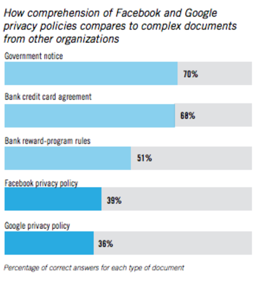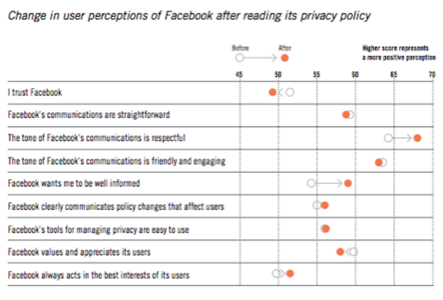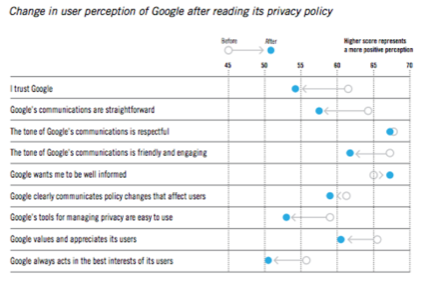Just how complex are those user agreements that most people skip reading when they sign up for Facebook or Google?
More complex than a credit card agreement or a government notice, according to a study released Tuesday by branding firm Siegel+Gale. On average, 400 survey participants who had carefully reviewed the agreements were only able to answer four out of 10 comprehension questions about the policies after their review.

What’s worse, of users who did understand the policies or had them explained to them, 75% said they would change their Facebook privacy settings and 63% said they would be more careful about how they used Google in the future.
“It’s time for these online giants to recognize that their policies bring an unacceptable web of complexity and risk to the lives of their users. The lack of understanding of online privacy is pervasive,” said Thomas Mueller, global director of customer experience of Siegel+Gale. “Bringing greater simplicity to what Web users read online will engender trust among users and only benefit Facebook’s and Google’s reputation.”
We’ve asked Facebook and Google for comment and will update as soon as we hear back from them.

Among the study’s other key findings:
All of these issues are compounded by the fact that privacy policies, particularly those used by social networks, are ever-evolving and ever-changing. Even if a user can understand a privacy policy, it can – especially in the case of Facebook – change without their knowledge.
- The comprehension rates for credit card agreements (70%) and government notices (67%) were far higher than those for Google (36%) and Facebook (39%).
- Just one in five Facebook users were able to figure out how to block a third-party application or website from accessing information they shared on Facebook after reading the social network’s privacy policy.
- Less than one in four Google+ users could figure out whether their profile was publicly viewable to anyone after reading Google’s privacy terms.
“This complexity erodes trust and jeopardizes online privacy,” said Irene Etzkorn, executive director of simplification of Siegel+Gale. “Clearly, Facebook, Google and other online service providers operate based on consumer trust, and failure to address privacy concerns in a meaningful way will lead to consumer disenchantment and additional regulatory restrictions.”


















